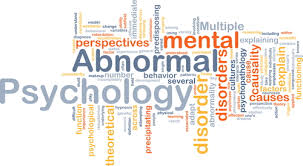
Abnormal psychology is a branch of psychology that studies atypical patterns of behavior, emotion, and thought processes, aiming to understand, diagnose, and treat various mental disorders. This field explores deviations from the norm in mental health, emphasizing the importance of cultural, social, and historical contexts in defining what is considered abnormal.
One key aspect of abnormal psychology is the identification and classification of mental disorders. The Diagnostic and Statistical Manual of Mental Disorders (DSM-5) is widely used as a reference guide for this purpose. It categorizes disorders based on symptoms, duration, and impairment, helping clinicians make accurate diagnoses. However, the field acknowledges the evolving nature of these classifications, as societal perspectives and scientific understanding progress.
Understanding abnormal psychology requires considering various factors contributing to mental health issues. Biological factors, such as genetics and neurochemistry, play a crucial role. Genetic predispositions may increase vulnerability to certain disorders, while imbalances in neurotransmitters can affect mood regulation and cognitive functioning. Additionally, neurological factors, such as brain structure and function, are increasingly recognized in understanding disorders like schizophrenia or bipolar disorder.
Psychological factors, including individual experiences, personality traits, and coping mechanisms, also contribute to abnormal psychology. Childhood experiences, trauma, and adverse life events can shape one's mental health. For example, post-traumatic stress disorder (PTSD) often stems from exposure to severe trauma. Personality disorders, such as borderline personality disorder, are characterized by enduring patterns of behavior, cognition, and inner experience that deviate significantly from societal expectations.
Sociocultural influences are essential in comprehending abnormal psychology. Cultural norms and societal expectations impact the definition of normalcy and influence the manifestation of disorders. Cultural variations in expressing distress or coping mechanisms highlight the need for a culturally sensitive approach to diagnosis and treatment. Moreover, socioeconomic factors, such as access to resources and social support, can significantly affect mental health outcomes.
The study of abnormal psychology also delves into various theoretical perspectives to explain and treat mental disorders. The psychodynamic perspective, rooted in Freudian theory, emphasizes unconscious conflicts and unresolved childhood experiences as the basis for abnormal behavior. Behavioral perspectives focus on observable behaviors and reinforcement mechanisms, while cognitive perspectives explore distorted thought processes and cognitive patterns contributing to disorders.
Biological approaches, including psychopharmacology and neuroscience, aim to address abnormal psychology through medication and understanding brain functioning. Medications such as antidepressants, antipsychotics, and mood stabilizers target specific neurotransmitter systems to alleviate symptoms. Neuroimaging techniques, like fMRI and PET scans, provide insights into the neural underpinnings of various disorders.
Treatment modalities in abnormal psychology encompass a broad spectrum, ranging from psychotherapy to pharmacotherapy. Cognitive-behavioral therapy (CBT) is widely used for many disorders, focusing on modifying maladaptive thought patterns and behaviors. Other therapeutic approaches include psychodynamic therapy, humanistic therapy, and dialectical behavior therapy (DBT). In severe cases, psychiatric interventions and hospitalization may be necessary to ensure safety and stabilization.
Despite significant advancements, challenges persist in the field of abnormal psychology. Stigma surrounding mental health issues continues to hinder open discussions and seeking help. Additionally, the intersectionality of factors influencing mental health requires ongoing research and collaboration across disciplines.
In conclusion, abnormal psychology is a multifaceted field that investigates deviations from typical mental health patterns. Understanding the biological, psychological, and sociocultural factors contributing to mental disorders is crucial. The evolving nature of classifications, coupled with diverse theoretical perspectives and treatment modalities, underscores the complexity of abnormal psychology. Continued research, destigmatization, and interdisciplinary collaboration are essential for advancing our comprehension and addressing the diverse challenges in this dynamic field.


You must be logged in to post a comment.